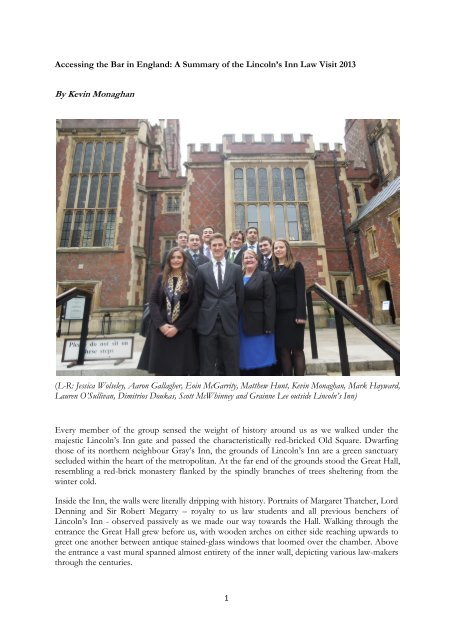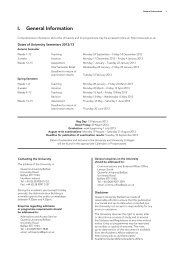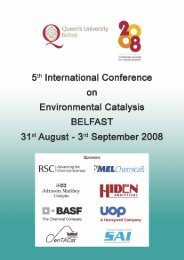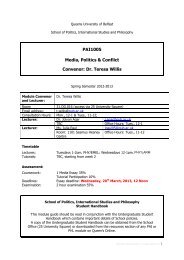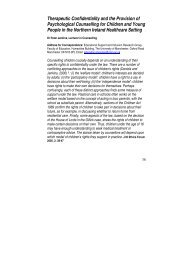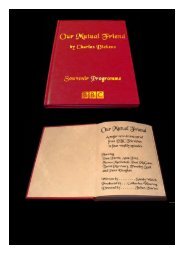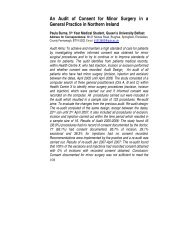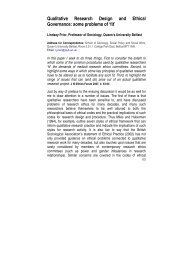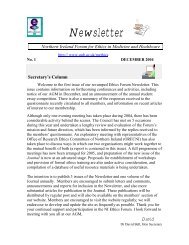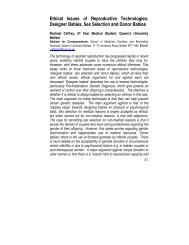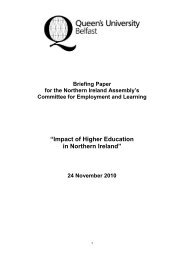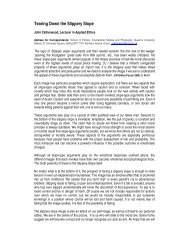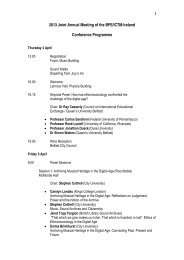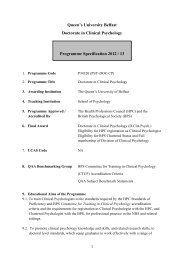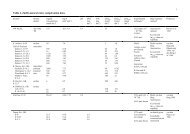Lincoln's Inn Visit 2013 - Queen's University Belfast
Lincoln's Inn Visit 2013 - Queen's University Belfast
Lincoln's Inn Visit 2013 - Queen's University Belfast
You also want an ePaper? Increase the reach of your titles
YUMPU automatically turns print PDFs into web optimized ePapers that Google loves.
Accessing the Bar in England: A Summary of the Lincoln’s <strong>Inn</strong> Law <strong>Visit</strong> <strong>2013</strong><br />
By Kevin Monaghan<br />
(L-R: Jessica Wolseley, Aaron Gallagher, Eoin McGarrity, Matthew Hunt, Kevin Monaghan, Mark Hayward,<br />
Lauren O’Sullivan, Dimitrios Doukas, Scott McWhinney and Grainne Lee outside Lincoln’s <strong>Inn</strong>)<br />
Every member of the group sensed the weight of history around us as we walked under the<br />
majestic Lincoln’s <strong>Inn</strong> gate and passed the characteristically red-bricked Old Square. Dwarfing<br />
those of its northern neighbour Gray’s <strong>Inn</strong>, the grounds of Lincoln’s <strong>Inn</strong> are a green sanctuary<br />
secluded within the heart of the metropolitan. At the far end of the grounds stood the Great Hall,<br />
resembling a red-brick monastery flanked by the spindly branches of trees sheltering from the<br />
winter cold.<br />
Inside the <strong>Inn</strong>, the walls were literally dripping with history. Portraits of Margaret Thatcher, Lord<br />
Denning and Sir Robert Megarry – royalty to us law students and all previous benchers of<br />
Lincoln’s <strong>Inn</strong> - observed passively as we made our way towards the Hall. Walking through the<br />
entrance the Great Hall grew before us, with wooden arches on either side reaching upwards to<br />
greet one another between antique stained-glass windows that loomed over the chamber. Above<br />
the entrance a vast mural spanned almost entirety of the inner wall, depicting various law-makers<br />
through the centuries.<br />
1
Upon entering the Great Hall each student was given a unique number printed on a piece of<br />
paper, and only during (the <strong>Inn</strong>’s Treasurer) Joanna Robinson’s speech did we actually discover<br />
what they were for. We were all asked to stand, representing two-hundred would-be barristers.<br />
Scores of students were asked to sit down as their number was called, representing those who<br />
fail to secure pupillage, tenancy, or a place on the BPTC every year. In the end no more than<br />
twenty students remained standing - a harrowing reminder of the fierce competition faced by<br />
prospective barristers.<br />
The speakers were at pains to stress that this was not a recruitment exercise, but rather a series of<br />
informative talks with a recurrent theme; the odds are stacked against you, but for the most able<br />
and determined the rewards are great. Geoffrey Tattershall QC alleviated that securing a<br />
scholarship from one of the <strong>Inn</strong>s is an appropriate test of a candidate’s suitability. Above all,<br />
speakers stressed the folly of undertaking the BPTC without having first secured a pupillage.<br />
Greg Callus helpfully noted the one year waiting period between securing your pupillage and<br />
actually starting it, advising students to take advantage of the gap by undertaking the BPTC in<br />
that year.<br />
Ravi Nayer spoke on life at the employed Bar. Self-employment is not for everyone and the<br />
employed Bar can offer numerous advantages, such as increased financial security (which is<br />
particularly enticing during one’s early years as a barrister), pension plans and sick pay. 20% of<br />
barristers in England and Wales are employed by private companies or in government legal<br />
services. A former History student who converted to Law through the GDL, Nayer was an<br />
encouraging example to those students currently undertaking a post-graduate conversion course<br />
to law. Also of notable mention was Matthew Hellens, who after a stunning introduction ran<br />
through his ten top tips for budding barristers, balancing the humorous and the informative for a<br />
compelling discourse and demonstrating a genuine love for the job: “I have the best job in the<br />
world”.<br />
During the delicious three-course meal students had the opportunity to talk to members of the<br />
<strong>Inn</strong> who were intentionally interspersed between tables. By all accounts, the members were very<br />
welcoming and friendly, chatting and openly answering any queries the students had. For their<br />
part students took advantage of the chance to pick the brains of experts in fields ranging from<br />
commercial law to criminal law and everything in between.<br />
We extend our thanks to Lincoln’s <strong>Inn</strong> for such an invaluable experience. Indeed students may<br />
have been just as much dissuaded by the statistics as they were persuaded as the barristers’ own<br />
passion. Either way, the visit did all any student could ask, giving us a clearer vision of the route<br />
from university to the Bar as well as an honest reflection on what it takes to reach that goal.<br />
Finally we would like to thank Dr. Doukas, who led the visit and whose company was greatly<br />
appreciated.<br />
Kevin Monaghan, 3 rd year student, LLB Honours Common and Civil Law with French,<br />
QUB School of Law<br />
2
(L-R: Rebecca McKinty, Jessica Wolseley, Matthew Hunt, Lauren O’Sullivan, Aaron Gallagher and Eoin<br />
McGarrity in the Lincoln’s <strong>Inn</strong> Great Hall)<br />
3
Trip to Lincoln’s <strong>Inn</strong> (21-22 March <strong>2013</strong>)<br />
By Lauren O’Sullivan<br />
(L-R: Jessica Wolseley, Eoin McGarrity, Matthew Hunt, Kevin Monaghan, Mark Hayward, Lauren<br />
O’Sullivan, Dimitrios Doukas, Scott McWhinney and Grainne Lee outside Lincoln’s <strong>Inn</strong>)<br />
The weather was freezing, the bodies were tired but the excitement was palpable as we<br />
assembled at 4.45am at George Best Airport for our scheduled flight to London. Ten students<br />
from across the School of Law were selected to visit Lincoln’s <strong>Inn</strong>, one of the four <strong>Inn</strong>s of Court<br />
in the jurisdiction of England and Wales, for an information session and formal dinner. We<br />
came from different programmes, we were different ages but we shared a common interest: we<br />
were all curious about becoming a barrister in England.<br />
We arrived in London and took the Gatwick Express into Victoria. We used the travelling time<br />
to bond: I learned that some students were absolutely committed to life at the Bar and were<br />
simply trying to decide between Northern Ireland and England; while others, like myself, were<br />
using the opportunity of a more-or-less fully funded trip to decide if the Bar was the right path at<br />
all. In my dream scenario I would like to do a PhD and be an academic (don’t judge, some<br />
people like writing essays!), but I felt that I should check out all the available options. As a<br />
mature student, I wanted to be absolutely sure that my next career move would be the right one.<br />
It was reassuring to learn that many other students weren’t really sure of where they wanted to<br />
go post-degree either!<br />
4
Trying to finagle ten tired students and their luggage through a busy train station, ensuring that<br />
we bought the right Oyster Cards, found the right tube line and got off at the right stop was no<br />
mean feat, and Dr Doukas deserves plaudits for his calmness and grace under fire. Any of you<br />
who have been to London will know that there aren’t many leafy suburbs, but the Goodenough<br />
Club, where we were staying for the night, was in one such place: it overlooked one of those<br />
private residents’ gardens in the middle of the square (which those of you of a certain age, and of<br />
a romantic disposition, will recognise from Notting Hill). After a quick breakfast down the road<br />
and despite some initial issues checking-in, which our astute leader handled with aplomb, we<br />
were shown to spacious and comfortable rooms, and took an hour off to relax and get ready for<br />
the big event, a ten-minute walk away in Lincoln’s <strong>Inn</strong>.<br />
The first thought I had upon seeing Lincoln’s <strong>Inn</strong> was “it’s like a bigger version of Queens!” The<br />
red brick looked a lot like home and any of you who have spent time in the Lanyon Building will<br />
easily imagine the environ we were in. We were invited into a busy and buzzing reception area.<br />
Students from schools of law all over the country had been invited to attend, and about 200 had<br />
done so, though it was with some pride that we discovered that we had travelled the furthest.<br />
We were then hustled into a massive Great Hall-esque room for an information session on Life<br />
at the Bar with a variety of speakers. First though: a game designed to demonstrate the chances<br />
of securing a place at the Bar, which I won’t explain in detail as it might ruin the fun for those of<br />
you who go next year. Those of you who know incoming Law Society President Eoin McGarrity<br />
will be little surprised to learn that he was the last of our men standing!<br />
The process of becoming a barrister in England is markedly different than in Northern Ireland.<br />
There is no Institute exam, rather you apply to any of the many universities offering the Bar<br />
Professional Training Course (BPTC), and your place is secured solely on your undergraduate<br />
results. There are hundreds of available places (unlike here, where in <strong>2013</strong>-2014 the number of<br />
places on the Bar course will be reduced to 20) and a good 2:1 will usually get you in; some<br />
universities will accept a 2:2 or even a third. Though this may seem appealing (no Institute<br />
exam?! Don’t necessarily need to be a clever clogs?! Wa-hey!), there is a major issue with this<br />
system: the Bar Council do not help you to get a ‘pupillage’, so there is no guarantee that once<br />
you have finished your vocational training course (which costs around £17,000) and learned the<br />
skills of becoming a barrister that you will find a mentor to ‘take you out’ and give you<br />
experience in court. You cannot fully qualify as a barrister without a pupillage, competition is<br />
fierce and, as we learned at the information sessions, disappointment abounds. There is a further<br />
drawback to the English Bar: they operate in ‘sets’ or ‘chambers’ and the reality is, even once<br />
fully qualified as a barrister, unless you get taken on as a ‘tenant’ by one of these, it will be very<br />
difficult to get any work.<br />
The speeches started with the Chairman of Lincoln’s <strong>Inn</strong> telling us that the purpose of the<br />
session was absolutely not to recruit: “we have too many barristers as it is, we just want to make<br />
you aware of the realities of the current Bar before you set your heart on it.” Hmmm, this didn’t<br />
sound encouraging. Things got worse, successive speakers outlined the difficulties facing<br />
barristers, including cuts to Legal Aid and the rise of in-house Solicitor Advocates. An Oxfordeducated<br />
first class graduate is now working as an in-house barrister because he failed to secure a<br />
tenancy post-qualification; a second newly-qualified barrister detailed the forty rejection letters he<br />
received before securing a pupillage. He also proffered some stark statistics: of the approximately<br />
7,000 students who completed the BPTC last year only 350 pupillages were awarded, and even<br />
less tenancies at Chambers. On this analysis, it seems a bleak time to be considering the English<br />
Bar.<br />
5
Yet they gave us some valuable advice on how to make your application stand out, which I will<br />
distil into one word: experience. If you are planning a career at the Bar in England, you need to<br />
start looking for a mini-pupillage with a Chambers, preferably in England, now. You need to<br />
start networking and getting your name out there. And I would advise making full use of the<br />
Careers Service, who will not only help you write your applications and CVs but will also arrange<br />
mock interviews. They ended the speeches on a high note, a family law barrister divulging his<br />
‘Top 10 tips for surviving at the bar’, (the first one being always know where the nearest Marks<br />
and Spencer’s is in case you spill coffee on your shirt on the way to court and need a new one)<br />
and reassuring us that if you have enough self-belief and enthusiasm for the law, anyone could<br />
thrive as a barrister.<br />
The speeches were followed by a wine reception and dinner, in which we were assigned places<br />
next to or near Lincoln’s <strong>Inn</strong> barristers and judges. We were encouraged to network, and to ask<br />
any question we felt necessary to ameliorate our understanding of the Bar. I was sat beside<br />
Justice Patrick O’Neill, a district court judge who specialises in equity, tort and family cases. We<br />
quickly established a connection with Ireland (his parents were Limerick people, as am I) and<br />
chatted easily. He advised not to be too quick to specialise in one area of law: the more fields you<br />
practice in, the more work you will get. I appreciated this practical advice. The food was<br />
excellent, the wine flowed freely and I enjoyed the traditional ‘quirks’ of dining at the <strong>Inn</strong>, like<br />
the branded crockery and sitting down to toast the Queen (which, though it sounds disrespectful,<br />
has a legitimate story behind it, which I won’t ruin for those of you planning to go next year). At<br />
the end of dinner, Justice O’Neill gave me a business card and encouraged me to get in touch if<br />
I ever wanted to shadow him, which I thought was a lovely gesture. After the port and a bit<br />
more networking with a QC and a newly-appointed High Court judge, we decided to leave<br />
Lincoln’s <strong>Inn</strong> and decamped to the nearest bar for a debriefing session and a hot toddy.<br />
The reaction to the evening was universally positive, and all were agreed that we had gotten<br />
something out of it. For me, it has highlighted that I probably do not have the enthusiasm and<br />
drive to succeed at the English Bar, though I haven’t yet ruled out the Northern Irish and<br />
Republic Bars and am preparing for the dreaded Institute exam in December. I was impressed<br />
by Lincoln’s <strong>Inn</strong>, by its surrounds and illustrious history, and I appreciated that they were<br />
brutally honest with us about the current prospects of the Bar. I feel they helped me to make an<br />
informed decision about my future that reading a prospectus or brochure couldn’t have done.<br />
The trip was a lot of fun, and I am delighted I was chosen to be a part of the group representing<br />
the School of Law at this prestigious event. Even a flight cancellation, which resulted in the<br />
majority of the group being stranded in Gatwick for 10 hours with a hangover, while a<br />
snowstorm raged in <strong>Belfast</strong>, cannot quell my enthusiasm for this trip. Things I learned: don’t<br />
ever ask for caramel sauce to be put on your McFlurry at the Gatwick McDonald’s because they<br />
will not entertain the notion; a £14 food voucher will not go very far at Frankie & Benny’s;<br />
Gatwick does not have sufficient plugs for charging rapidly dying batteries; and good company<br />
and banter can ease the pain of delay and help through even the bumpiest, most turbulent,<br />
flights and landings.<br />
I can’t recommend enough that anyone contemplating the Bar apply to go on this trip next year.<br />
You’ll meet new people, have great craic and it may even help you clarify your future. My thanks<br />
to Lincoln’s <strong>Inn</strong>, the School of Law and, above all, to Dr Doukas, for arranging the trip, making<br />
it so enjoyable and for taking such good care of us before, during and after.<br />
Lauren O’Sullivan, final year student, Master in Legal Science, QUB School of Law<br />
6
(L-R: Rebecca McKinty, Jessica Wolseley, Matthew Hunt, Lauren O’Sullivan, Aaron Gallagher and Eoin<br />
McGarrity in the Lincoln’s <strong>Inn</strong> Great Hall)<br />
7
(L-R: Dimitrios Doukas, Jessica Wolseley and Aaron Gallagher in the Lincoln’s <strong>Inn</strong> Great Hall)<br />
8


